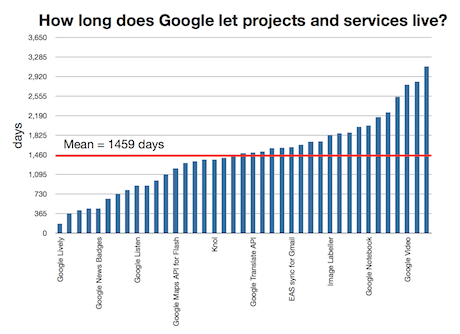The closure of Google Reader has got early adopters and developers worried that Google services or APIs they adopt will just get shut off. An analysis of 39 shuttered offerings says how long they get

Will Google Keep join the growing ranks og services and APIs Google has killed off? If so, when? Photograph: Alamy
Earlier this week, Google introduced Google Keep - a service intended to let you store notes and other information "in the cloud". Those with a long memory may think that it looks a little familiar; that's because it is: Evernote offers a very similar service already (and has done since June 2008). Also also, Google used to have a product called Google Notebook, introduced in May 2006, which did much the same thing. So why Google Keep? Because Notebook waskilled - unloved, apparently unnoticed - in November 2011. (The love had already stopped in 2009, when development ended.)
You might think that the introduction of Keep would see the early adopter geeks jumping to use it - even those who don't remember Notebook's demise. Instead, it's been met with sidelong glances.
That's because the announcement earlier this month that Google Reader, an RSS aggregator, will be shutting down from 1 July has made people who relied on it much more wary about trusting their data to Google's services.
The worry this time isn't about privacy; it's whether they'll wake up in a few years' time and read a blogpost with the doom-laden words like "sadly, it never gained the traction among users…" followed by a date when the lights will go out. And then either your data will die, or it will have to be collected and then toted around like an old sofa, which will then have to be pushed up the stairs into a new service.
Closing time
When is that likely to happen? According to data I've gathered on 39 Google services and APIs - ranging from the short-lived "Google Lively" (a 3D animated chat introduced on 9 July 2008 and euthanised just 175 days later, on 31 December) to the surprisingly long-lived iGoogle (a personalised Google homepage, to which you could add RSS feeds and data, introduced in May 2005 and due for the chop in November after 3.106 days) - the average lifespan of products that don't make the cut is 1,459 days. That's just two days short of four years. For those keen on statistics, the standard deviation is 689 days; bar one item (iGoogle) all the group members lie within two standard deviations of the mean.
In collating the group, I excluded hardware (such as Google Mini, a stand-alone search appliance, or the incredibly short-lived Nexus Q from 2012 which never even made it to shops) and initiatives such as REGoogle Translate API
 How long do Google services and APIs survive? A Guardian analysis of 39 that have been killed off says just under four years, on average. Click for larger version.
How long do Google services and APIs survive? A Guardian analysis of 39 that have been killed off says just under four years, on average. Click for larger version.So if you want to know when Google Keep, opened for business on 21 March 2013, will probably shut - again, assuming Google decides it's just not working - then, the mean suggests the answer is: 18 March 2017. That's about long enough for you to cram lots of information that you might rely on into it; and also long enough for Google to discover that, well, people aren't using it to the extent that it hoped. Much the same as happened with Knol (lifespan: 1,377 days, from 23 July 2008 to 30 April 2012), or Wave (1,095 days, from May 2009 - 30 April 2012) or of course Reader (2,824 days, from 7 October 2005 to 1 July 2013).
If you want to play around further with the numbers, then if we assume that closures occur randomly as a normal distribution around the mean, and that Google is going to shut Google Keep, then there's a 68% chance that the closure will occur between April 2015 and February 2019. Even the later date wouldn't be much longer than Evernote - which is still growing - has already lasted. Is Google really that committed to Keep?
The core lives on - but what's core?
The obvious objection is that these figures ignore all the services and APIs that Google has started and kept going. There's search, obviously. There's Android. There's Google Docs. Google Earth. Google Maps. Street View. Google Voice. And so on, and on.
To which the answer is: yes, but there's no way of telling a priori whether a service or API that you start using is going to be one that receives Larry Page's favour, or whether it's going to turn out to be the next one to fall victim to the scythe of "more wood behind fewer arrows". It's that uncertainty which has people worried.
The more one looks into it, the harder it is to discern what makes a service "core" to Google. After all, iGoogle (3,106 days) seems like the perfect way to make people keep coming back to Google's home page, and more than that to make sure they logged in: it let you create a customised version of the Google home page with RSS feeds and other information. Isn't that part of the core business - to get people to come to Google and be signed in? Yet it's for the chop.
Or how about Google Search Timeline, which gave you a visual representation of search results for a particular phrase or subject over time? That's the sort of tool, again, that other search engines don't offer; it seems like a USP (unique selling point) to add to many others, because it lets you zero in on particular periods. Ideal for researchers; a great way to get those high-quality, influential people who do deep search to keep coming back, and recommending it to their friends.
But no - it was one of the shorter-lived products, launched in April 2009 and killed in January 2011, a 640-day existence.
This apparently inability to decide whether something's important or not is acceptable behaviour in a small startup that's desperately throwing everything at the wall in the hope that it will spark the magic moment where everyone flocks to its service (and even hand over money).
But in a giant corporation that is a household name, it's extremely dangerous. Once the geeks stop trusting you, they stop recommending you. I've noticed a number of developers this week saying that they're not going to start using Keep precisely because they're worried that it, and by extension their data, is on borrowed time. They're even looking askance at Appspot, Google's virtual machine in the cloud, because they wonder about its commitment to that, or how it might be changed.
Hence Om Malik, usually a consumer of all things new, telling Google that as far as he's concerned, "Sorry, Google, you can Keep it to yourself" because he's so angry that Reader has been thrown under the bus. Hence Mike Loukides at O'Reilly Radar hardly helping things by noting that "in the larger scheme of things, Keep is small potatoes". That's precisely what people are worried about, of course.
As Loukides says,
"What if they kill the Prediction API, and you rely on that? There are alternatives to Reader, there may be alternatives to Docs (though most of the ones I knew have died on the vine), but I don't know of anything remotely like the Prediction API. I could go on with "what ifs" forever (Authentication API? Web Optimizer?), but you get the point."
We do indeed.
By the way, the Prediction API was launched on 19 May 2010. That seems to suggest we should be watching out for a blogpost around 16 May 2014. Sorry, Mike.
A quick update: George Moore asks on Twitter whether there's a trend towards killing services sooner. As a quick sort on the table below shows (click on the "Started" column so earlier dates are at the top), there is - services are being killed quicker.
The list of services, with dates, is below. Please add any other closed services and APIs you know about in the comments, with start and end dates (with links please). Please note: dates below are in English format, ie dd/mm/yyyy.
.


If you're looking for a reputable contextual advertising network, I suggest you try Clicksor.
ReplyDelete